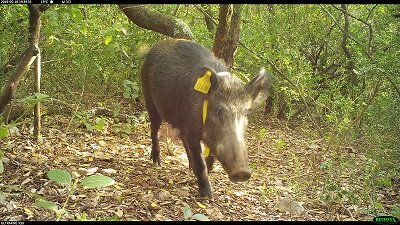We recently received exciting news that a collaborative project under the leadership of one of the Mammal Research Institute’s fellows, Dr Simon Chamaillé-Jammes, has received funding until the end of 2023. Dr Chamaillé-Jammes is a behavioural ecologist from the Centre d'Ecologie Fonctionnelle et Evolutive with expertise in both field and quantitative ecology. The project is multi-disciplinary in nature, bridging the fields of ecology, electronics and data science, and will investigate the impact of human activities on the resting behaviour of animals.
A camera-trap photo of a wild boar equipped with a GPS collar
Most of our planet has been affected by changes made by man, so this project will develop biologgers to investigate the subsequent effects experienced by animals in these altered landscapes, and compare these to the behaviour of the same species in protected areas. It is well-known that humans need sufficient rest in order to function properly and the same applies to animals, probably to an even greater degree, because they need to function optimally at all times in order to forage successfully, avoid predators and to be reproductively successful. We know relatively little about the resting patterns and needs of wild populations and this project aims to determine some of these baselines as well as looking at the impact that humans may have on these natural patterns, at both a species and individual level. In areas of greater human impact certain species may become hyper vigilant while others may be positively impacted by the removal of predators, so disturbance may have both pros and cons. This project aims to use information from many different sources, incorporating numerous variables, in order to describe the consequences of human disturbance and predict effects in the future.
A zebra equipped with an audiologger, which provides audio and accelerometry information
Biologging involves both the development and deployment of animal-borne sensors, allowing researchers to monitor the environment that the animal is utilising, its behaviour in this environment and the interactions within and between species. Biologging has revolutionised the study of animal behaviour because data continues to be collected even when instrumented animals move into areas that are difficult for us to reach. They also log data throughout the night, during inclement weather and when we are not in the field. Lightweight biologgers with multiple sensors (acoustic, camera, locality, accelerometer etc.) will be developed and deployed initially on domestic animals in order to test their efficacy and collect test data before field deployments in France and southern Africa go ahead.
The project, primarily funded by two major laboratories of the I-Site MUSE consortium, the Centre d'Ecologie Fonctionnelle et Evolutive and the Laboratiore d'Informatique, de Robotique de Microélectronique de Montpellier, brings together many experts in the fields of modern ecology and technological sciences, including the Mammal Research Institute’s Director, Prof. André Ganswindt, and Assoc Prof. Adrian Shrader whose role is to facilitate fieldwork in southern Africa and contribute their expertise in the behavioural ecology and physiology of African mammals.
Other academic collaborators are Distinguished Prof. Andy Sih (University of California Davis, USA), Dr Marion Valeix (Laboratory of Biometry and Evolutionary Biology, CNRS Lyon, France) and Assistant Prof. Aurélie Coulon (Muséum national d'Histoire naturelle, Paris, France).
Meredith Thornton, Science Communicator
Mammal Research Institute



